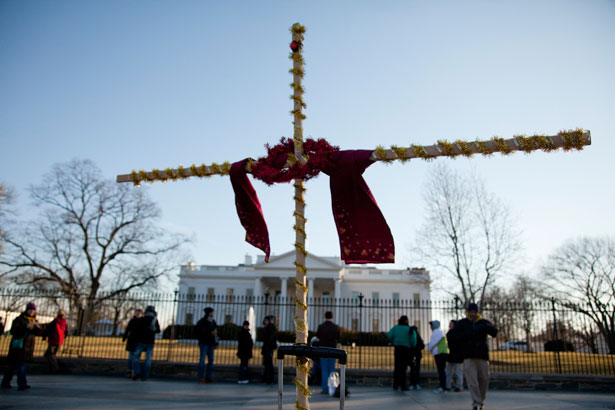
A cross stands in front of the White House as pro-life demonstrators gather on Sunday, Jan. 23, 2011, in Washington. (AP Photo/Evan Vucci)
It takes a special kind of willful ignorance to oppose legal abortion these days. In fact, being disconnected from reality has become the most definitive characteristic of the anti-choice movement. Pregnancy from rape? The body can “shut that whole thing down.” Birth control? Just another kind of abortifacient. Then there are the made-up “post-abortion syndromes” and unsubstantiated links between abortion and breast cancer. But no kind of anti-choice rhetoric is more dangerous than the fantasy that making abortion illegal will not hurt women.
Like many other feminists, I spent a lot of time this past month sending out messages and petitions about Beatriz, a young mother in El Salvador who was fighting for a life-saving abortion. The 22-year-old has lupus, and the longer she remained pregnant, the greater became her chances of dying. (Making the decision even more clear-cut: her fetus had a severe birth defect that makes survival near-impossible.) Pro-choice groups across the globe condemned the rulings of the Salvadoran courts; more than 4,000 people have signed a petition asking Pope Francis to speak out on Beatriz’s behalf. After El Salvador’s Supreme Court ruled that her death wasn’t imminent enough to warrant an abortion, Beatriz was finally granted a C-section—a riskier “solution” that meant delivering her doomed fetus.
In the period when Beatriz’s fate was still undecided, I wrote on Twitter: “This is what pro-life looks like.” A woman tweeted back: “In El Salvador that may b the case but this is America & if truly life or death not all pro lifers would agree!” What struck me in particular was this woman’s certainty that what she “agreed” with had anything to do with the way laws are enforced. It’s magical thinking at its worst—but par for the course when it comes to legislating women’s bodies.
Take the video of anti-choice protests that went viral in the political blogosphere several years ago. A man filmed himself asking protesters outside women’s health clinics whether they thought abortion should be illegal. Unsurprisingly, all said yes. But when he asked how much jail time women who had abortions should be punished with, the response was crickets. These activists—committed protesters—seemingly never realized that if abortion is made illegal, women who procure the procedure would become criminals. And no matter how much these protesters waxed compassionate about women being the pawns and victims of abortion providers, it doesn’t change the fact that women will go to prison if Roe is overturned.
Popular
"swipe left below to view more authors"Swipe →
This isn’t even the most dangerous thing that anti-choice organizations go out of their way not to acknowledge. The Pro-Life Action League, for example, insists that before Roe, “there were not many illegal abortions, or illegal abortions were relatively safe.” The truth? According to the Guttmacher Institute, abortion was listed as the cause of death for almost 2,700 women in 1930—18 percent of maternal deaths. In 1965, abortion accounted for 17 percent of deaths attributed to pregnancy and childbirth—and those were just the reported cases.
Even with Roe still in place, the way laws pertaining to pregnancy are enforced often has little to do with the purported spirit in which they were enacted. As Lynn Paltrow, executive director of the National Advocates of Pregnant Women, pointed out on TheNation.com, feticide laws adopted after horrific incidents of violence against women—like Laci Peterson’s murder—are rarely used to go after abusers. Instead, Paltrow writes, “prosecutors in at least eighteen states have used their existing murder and feticide laws as a basis for arresting and prosecuting pregnant women who had abortions, or who suffered miscarriages, stillbirths or neonatal losses.” Indeed, that’s one of the many reasons pro-choice advocates oppose “personhood” measures that extend civil rights to fertilized eggs: they would not only give zygotes the same rights as the women who carry them, thereby making abortion illegal (which anti-choicers acknowledge); they could make birth control and emergency contraception illegal as well (which many don’t).
The vast majority of wishful thinking happens on the anti-choice side, but pro-choicers can let politics obscure the realities, too. When the FDA announced that Plan B would be available over the counter only to women and girls over 15 (despite science showing it’s safe for women of all ages), some pro-choice activists called it a victory. But the law says the medication will be available to young women who can prove their age—an impossibility for most teens, who don’t have the necessary identification. In most states, you have to be 16 to apply for a driver’s license, and in 2010, only 28 percent of 16-year-olds had one. The short version? It doesn’t matter what the FDA says; in real life, young women will still be unable to prevent an unwanted pregnancy. No, this isn’t the same as the anti-choicers’ use of deception, but the failure to connect the dots between what the law says and how it affects women’s lives is still disturbing.
The idea that what we believe is right will be taken into account when the laws are enforced is a nice thought. If true, it would mean that Ireland’s Savita Halappanavar would still be alive. But she’s not. She died of sepsis, after miscarrying, because a hospital refused to give her an abortion—even though she lived in a country that claims to allow the procedure if a woman’s life is at risk.
Abortion is complicated, as are our lives and health—and the fact that these choices are so complex and nuanced is precisely why we can’t legislate them. Wishing otherwise will never make it so.
Katha Pollitt wrote about Savita Halappanavar, the young woman who died of sepsis after she was denied an abortion in Ireland, last year.


